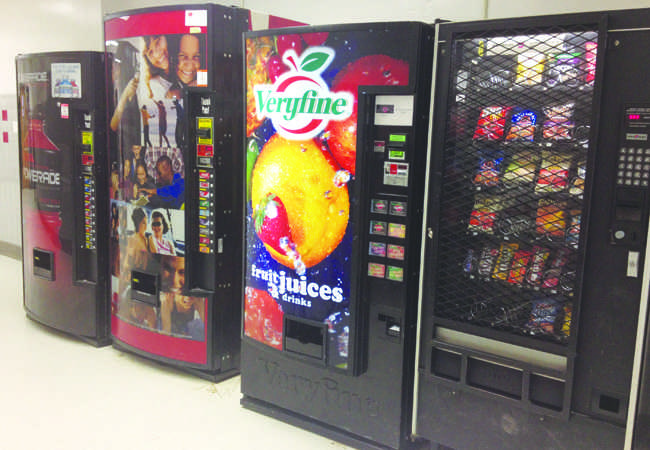Junk food marketing ban
Vending machines outside the gym.
The White House and the U.S. Department of Agriculture proposed a ban on junk food marketing in schools. Items that can be marketed in schools have to meet certain regulations, for example, foods must be low in fat, sugar and salt.
At a White House event, First Lady Michelle Obama announced two new reforms that will promote a healthier lifestyle to families across the nation on Feb.25. This ban is just one of her many proposals to help reduce obesity rates.
Michelle Obama’s campaign against obesity, called “Let’s Move” has been trying to make changes regarding, unhealthy foods and the overall lack of exercise of many.
Marketing techniques used in schools usually come in the form of posters or the use of products that are sponsored by a company.
Several organizations are trying to raise awareness about the obesity epidemic. With several reforms promoting healthy living, the Journal of the American Medical Association, reported that the obesity rate among children aged two to five years old has decreased 43% since 2004.
Previous Bans
Vending machine s are scattered around many schools, including AHS. These are popular during lunch time because thy provide quick and low-priced snacks.
Several schools around the nation are starting to ban the machines, or limit the times they can be used, as an effort to decrease the amount of snacking and calorie intake.
According to Time Magazine, in 2013, regulations such as reducing the salt content in vending machine snacks sold in schools were implemented to help kids eat healthier
Some were not satisfied with this rule because they felt like their choices were being limited and should be allowed to choose what to eat.
“I don’t think sponsorships necessarily make people get more [junk food]. I guess that’s one aspect, but I think that would just be silly to take it out,” junior Annika Hackfeld said.
Marketing Towards Children
It is not uncommon to see advertisements in children’s movies and programming sponsored by fast food chains. Companies lure children to want their parents take them to fast food establishments by offering toys with meals and giveaway contests.
Also children do not have much of a say of their food choices at home.
“I think that it won’t have much of an impact because parents probably still eat and drink [junk food] at home,” sophomore Erin Anh said.
The marketing of junk food to kids has been scrutinized in the past because many see it as an easy way to gain business since many small children do not understand the concept of advertising.
According to Time Magazine, “A 2013 study showed that between 2009 and 2010, 99% of fast food ads that aired on children’s TV channels like Cartoon Network and Nickelodeon came from McDonald’s and Burger King.”
Children are already susceptible to advertisements outside of school and the U.S Department of Agriculture wants to make sure that while kids are at school, they are not being marketed to by fast food companies.
Many of these techniques are overlooked because at first glance because they do not seem to be a marketing ploy. Many schools offer junk food as prizes for participating in activities. Some may remember having competitions in schools, such as offering a pizza party if everyone in the class passes the SOL.
“That’s the only real way for them to do stuff. I mean especially if they’re kids.” senior Karen Davilla said. “What else would they give them? Money? Broccoli for straight A’s? Junk food encourages kids.”
Who Is Affected?
Surprisingly, companies that would be the most affected such as Coca-Cola and PepsiCo. are not too upset about the new restrictions to their advertisements.
CEO and President of American Beverage Association, Susan Neely also believes that these new restrictions are fine.
“Mrs. Obama’s efforts to continue to strengthen school wellness make sense for the well-being of our school children,” Neely said.
Despite the new ban promoting healthier meals, many are not happy that there are several reforms about what people eat.

Berta is currently a senior. She has been on The A-Blast since her freshmen year and was first an Academics Editor during sophomore year and then became...











